Shatila Stories
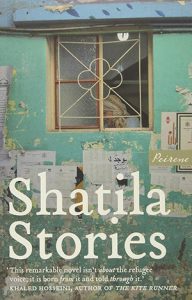
Author(s): Omar Khaled Ahmad, Nibal AlAlow, Safa Khaled Algharbawi, Omar Abdellatif Alndaf, Rayan Mohamad Sukkar, Safiya Badran, Fatima Omar Ghazawi, Samih Mahmoud, Hiba Marei
Translator: Nashwa Gowanlock
Publisher: Perine Books
Year of Publication: 2018
Print Length: 150 pages
Genre: Novel, Fiction / Realistic Fiction
Area: Shatila Refugee Camp, Lebanon
Topic: Palestinian, Syrian, Family, Friendship & Companionship, Refugees & Forced Migration, Violence, Resilience, Hope, Lived Experience
Most novels are written by professional writers using second hand material. Not this one. Peirene commissioned nine refugees, Palestinian and Syrian, to tell their ‘Shatila Stories’. The result is a piece of collaborative fiction unlike any other.
Adam and his family flee Syria and arrive at the Shatila refugee camp in Beirut. Conditions in this overcrowded Palestinian camp are tough, and violence defines many of the relationships: a father fights to save his daughter, a gang leader plots to expand his influence, and drugs break up a family. Adam struggles to make sense of his refugee experience, but then he meets Shatha and starts to view the camp through her eyes.
Longlisted for the EBRD Literature Prize 2019
‘This remarkable novel isn’t about the refugee voice; it is born from it and told through it. On every page, the glint of hope for dignity and a better life is heartbreakingly alive.’ Khaled Hosseini, author of The Kite Runner
Table of Contents
‘Don’t talk about the camp unless you know it.’
Introduction — Meike Ziervogel (Publisher of Peirene Press and editor the Peirene Now! series)
Shatila Alleys
The Arrival
Reham’s Story
Youssef’s Kingdom
The White Dress
Adam
The Dinner
Shatha
The Wedding Day
Canada Calling
No Man
An Angel by My Side
Afterword — Suhir Helal (editor, Shatila Stories)
Authors
Translator
Thank You
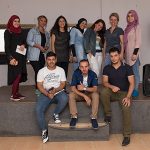
Omar Khaled Ahmad is Palestinian Syrian. He was born in 1998 in the Yarmouk camp in Damascus. In 2013 he fled the Syrian crisis and moved with his family to Shatila, Beirut. In 2016 he studies video journalism with the German Academy of the Deutsche Welle and now works for Shatila’s Campji, a youth media electronic platform for refugees. Omar has also directed a short film about life inside the Shatila camp.
More from Omar Khaled Ahmas in this library, click here.
Nibal Alalo is Syrian. She was born in 1975 in Deir ez-Zour. She obtained a master’s in sociology and worked for eleven years as a psychosocial support worker with Iraqi refugees in Damascus. She moved to Beirut in 2015 because of the war and is now working with Syrian refugees in the Shatila camp.
More from Nibal Alalo in this library, click here.
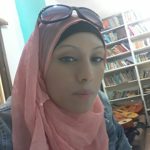
Safa Khaled Algharbawi is Syrian. She was born in 1990 in Damascus and has lived in the Shatila camp since 2013. She has a higher national diploma in economics.
More from Safa Khaled Algharbawi in this library, click here.
Omar Abdellatif Alndaf is Syrian. He was born in 1989 in Idlib, where he also obtained a diploma in alumunium and glass production. he fled to Lebanon in 2011. He loves Arabic poetry.
More from Omar Abdellatif Alndaf in this library, click here.
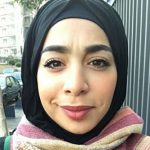
Rayan Mohamad Sukkar is Palestinian Lebanese. She was born in 1995 in the Shatila camp. She studies media at the Arab University of Beirut. In 2016 she completed a one-year course in video journalism with the German Academy of the Deutsche Welle and now works for Shatila’s Campji. She has also co-authored the play Tarah Bedda with the Ebaad organization and worked as an assistant director for a play at the American University in Beirut.
More from Rayan Mohamad Sukkar in this library, click here.
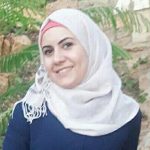
Safiya Badran is Syrian. She was born in 1986 and came to Beirut in 2011. She works for the NGO Basmeh & Zeitoneeh in the Shatila camp.
More from Safiya Badran in this library, click here.
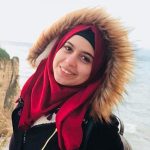
Fatima Omar Ghazawi is Palestinian Lebanese. She was born in 1997 in the Shatila camp. She is currently studying psychology at the Lebanese University and is a freelance writer for the magazine Wammda.
More from Fatima Omar Ghazawi in this library, click here.
Samih Mahmoud is Palestinian Syrian. He was born in 1998 in the Yarmouk camp in Damascus. He moved with his family to the Shatila camp in 2013. In 2016 he completed a one-year course in video journalism with the German Academy of the Deutsche Welle and now works for Shatila’s Campji.
More from Samih Mahmoud in this library, click here.
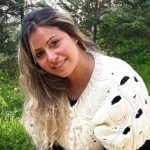
Hiba Marei is Palestinian Syrian. He was born in 1987 in the Yarmouk camp in Damascus. For three years she studied psychology at the Faculty of Education in Damascus before the Syrian crisis forced her to move to Beirut in 2012. She now works as a tutor in adult education in the Shatila Camp. Hiba also co-authored The History of the Puppet Theatre in Lebanese Arabic Theatre.
More from Hiba Marei in this library, click here.
Read some of the authors’ background stories here: https://www.middleeasteye.net/features/shatila-novel-refugee-authors-find-their-voice-page
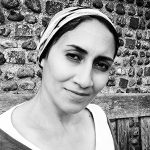
Nashwa Nasreldin (Gowanlock) is a British Egyptian writer, journalist and translator of Arabic literature. She is the co-translator with Ruth Ahmedzai Kemp of The Crossing: My Journey to the Shattered Heart of Syria by Samar Yazbek. Her translation of Abdelrashid Mahmoudi’s novel After Coffee is published by HBKU Press.
Source: https://www.peirenepress.com/shop/books/shatila-stories/
More from Nashwa Gowanlock in this library, click here.
